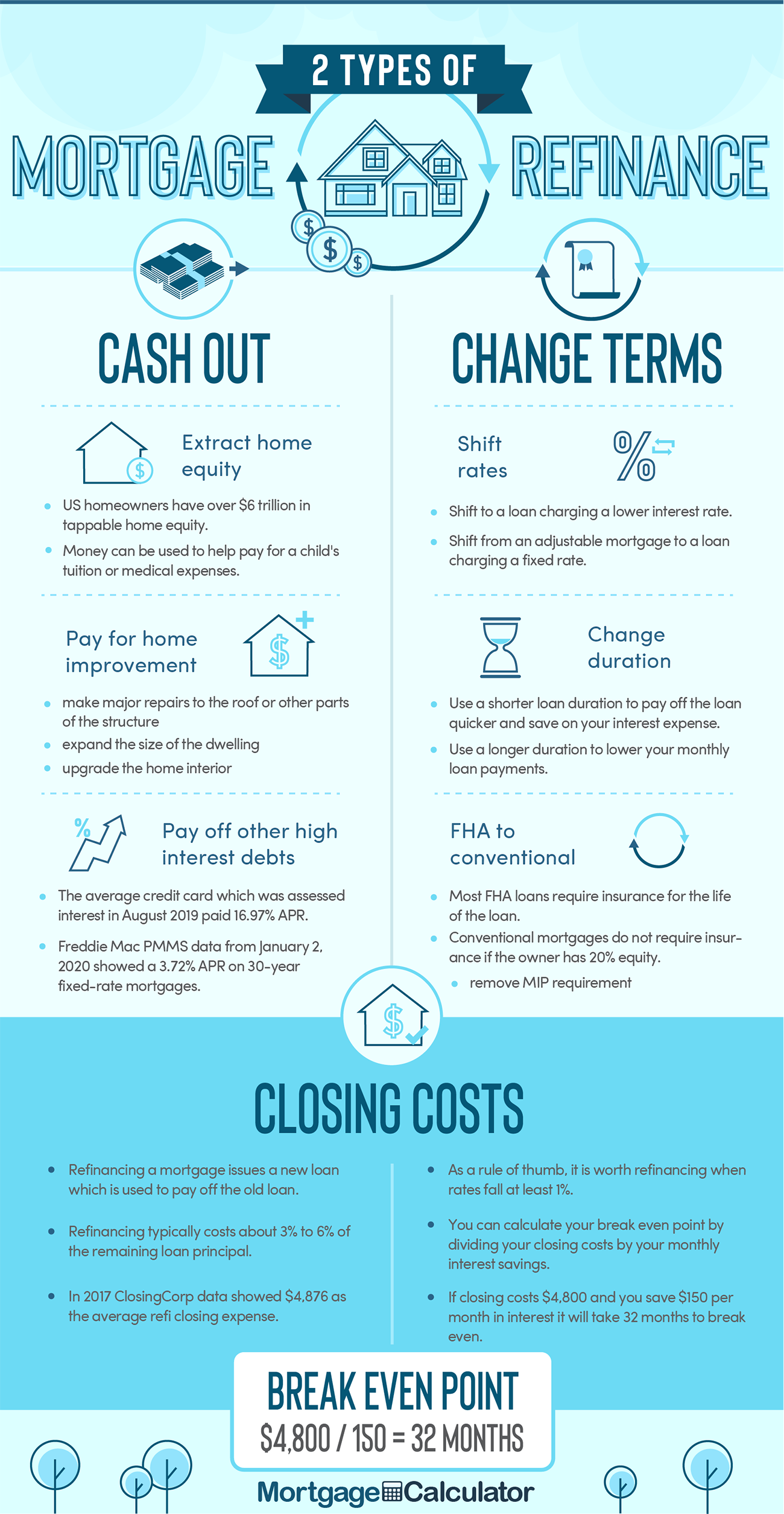
This calculator is for homeowners who are looking to make a strictly economic decision in terms of which loan will be better based upon comparing the interest expense and home equity against the closing costs associated with refinancing their home.

Want to do a Cash Out Refinance?
If you plan on doing a cash-out refinance then you should use this calculator to estimate how much equity you can extract & then calculate your new mortgage payments for that loan amount using our feature-rich mortgage calculator located on our homepage to calculate your new loan payments.
Is your current interest rate on your house too high? Use this free tool to view today's best home loan refi rates from top lenders & estimate your savings at a lower APR (Annual Percentage Rate). If you are considering consolidating a first and second mortgage into a single loan we also offer a mortgage consolidation calculator.
How much money could you save? Compare lenders serving El Monte to find the best loan to fit your needs & lock in low rates today!
By default rates for a 15-yr fixed-rate refinance loan for $320,000.00 are displayed in the table below. Filters enable you to change the loan amount, duration, or loan type.
 When you buy your home, it may not always be under the perfect circumstances. Your credit may not have been good enough to qualify you for the best interest rates or you may have took out a loan using adjustable rates. You may not have had the down payment you wanted. You may taken on more than you could really afford in your enthusiasm to own your first home.
When you buy your home, it may not always be under the perfect circumstances. Your credit may not have been good enough to qualify you for the best interest rates or you may have took out a loan using adjustable rates. You may not have had the down payment you wanted. You may taken on more than you could really afford in your enthusiasm to own your first home.
Refinancing can be the answer for many homeowners trying to balance their budget and meet their financial goals. In some cases, it can save you hundreds of dollars a month. However, it is not always the most appropriate solution. It's important to understand the pros and cons to ensure that you make the right decision for your personal circumstances.
If you only need a small sum of money or rates have risen it might make sense to keep your current mortgage and tap your equity using either a home equity loan or a revolving home equity line of credit instead.

Falling Interest Rates
One of the best signs that it's a good time is that interest rates have dropped or that you now qualify for lower interest rates based on your improved credit score or credit history. A two-point interest rate deduction on a $200,000 home could save you tens of thousands of Dollars over the life of a 30-year, fixed-rate loan. Typically, a full point or two is necessary to make refinancing worth your while. The savings from a half-point or less may take years to offset expenses, depending on the terms of your loan.
Shift From Adjustable to Fixed Rates
Another good reason to refi is if you want to get out of an adjustable-rate mortgage or to eliminate a second mortgage loan, or a piggyback loan. When your ARM is going to reset to a higher interest rate, you may be able to shift into a fixed-rate loan with a lower interest rate. Of course, your credit history will need to have improved significantly from when you were approved for the original loan. You can also refi to consolidate two loans into one single loan with one monthly payment.
Shift Into a Conventional Loan
FHA loans are easier to qualify for than conventional loans, allowing both low down payments and lower credit scores. FHA loans typically charge mortgage insurance premium (MIP) for the life of the loan. By shifting over to a conventional loan a homeowner can drop the insurance requirement so long as they have at least 20% equity in their home.
Pay Off Your Loan Faster
An often overlooked reason to refi is to pay off your home more quickly, perhaps in preparation for retirement. Instead of paying off your mortgage for another 25 years, you can pay it off in 15. Though you may have to pay more per month, you may end up spending far less over the years as a result of both a lower interest rate and a more rapid amortization repayment schedule. Every dollar of equity you build this year is a dollar that is not costing you interest for every remaining year of your life.
Extract Home Equity
Economic uncertainty around the COVID-19 crisis has left many house rich & cash poor Americans laid off or furlowed from work considering tapping their home equity.
Historically, a less-popular option is the “cash out” refinance, which can be used to help pay down other higher interest debts. The cash out option involves taking out a loan for more than the current remaining balance — assuming you have built up some home equity — and taking out the difference from the amount you still owe on your mortgage in cash. You can use that money to pay down other debts, fund business investment, or work on home improvement projects. If you tap most of your home equity you might have to pay a higher interest rate than a borrower who gives the lender a significant equity cushion.
In recent years as mortgage rates have fallen the spread between mortgage rates and HELOC rates has widened, making many homeowners who need a bit of cash durng a crunch consider a cash-out refinance a better option than a HELOC or a home equity loan.
The 2017 Tax Cuts and Jobs Act increased the standard deduction for individuals or married filing individually to $12,000, head of household to $18,000 & married filing jointly to $24,000. Those numbers are up significantly from $6,300, $9,300 and $12,600 in 2016. In 2021 standard deductions increased further to $12,550, $18,800 and $25,100 respectively. Previously around 47 million Americans itemized deductions, though under the new laws it is expected over 90% of taxpayers will simply use standard deductions. If you are unlikely to itemize your deductions, you can set your state & federal tax rates at zero in our refinancing calculator to remove the impact of taxes on the calculator's output.
It is also worth noting that if you increase your mortgage debt on a refinance then generally interest paid on that incremental mortgage debt typically is not tax deductible unless the money is used to expand or substantially improve the dwelling. Talk to your financial advisor if you are uncertain if your project qualifies. Be sure to save any related receipts in case you are audited.
The following graphic helps homeowners better understand the refinancing landscape.

If you want to calculate your breakeven date, we offer an easy-to-use mortgage refinance breakeven calculator.
Refinancing won't always save you money. It typically involves the same closing costs as your original loan, including attorney fees, appraisals and title insurance — though some fees may be waved as banks compete for your business. To determine if it is the best choice, you should compare your monthly savings to the costs you will have to put in and find out how long it will take you to break even. If you don't plan to live in your house that long — and preferably longer, refinancing isn't worth it. You may also face additional costs if your original loan has an early prepayment penalty.
The above calculator can help you quickly break down your costs and benefits to better understand if refinancing is the right choice for you. The calculator takes into account your interest rate, length of the loan, the amount of time you plan to stay in your home, origination and closing costs and taxes so you can get a complete financial analysis.
Explore conventional mortgages, FHA loans, USDA loans, and VA loans to find out which option is right for you.
Check your options with a trusted El Monte lender.
Answer a few questions below and connect with a lender who can help you save today!